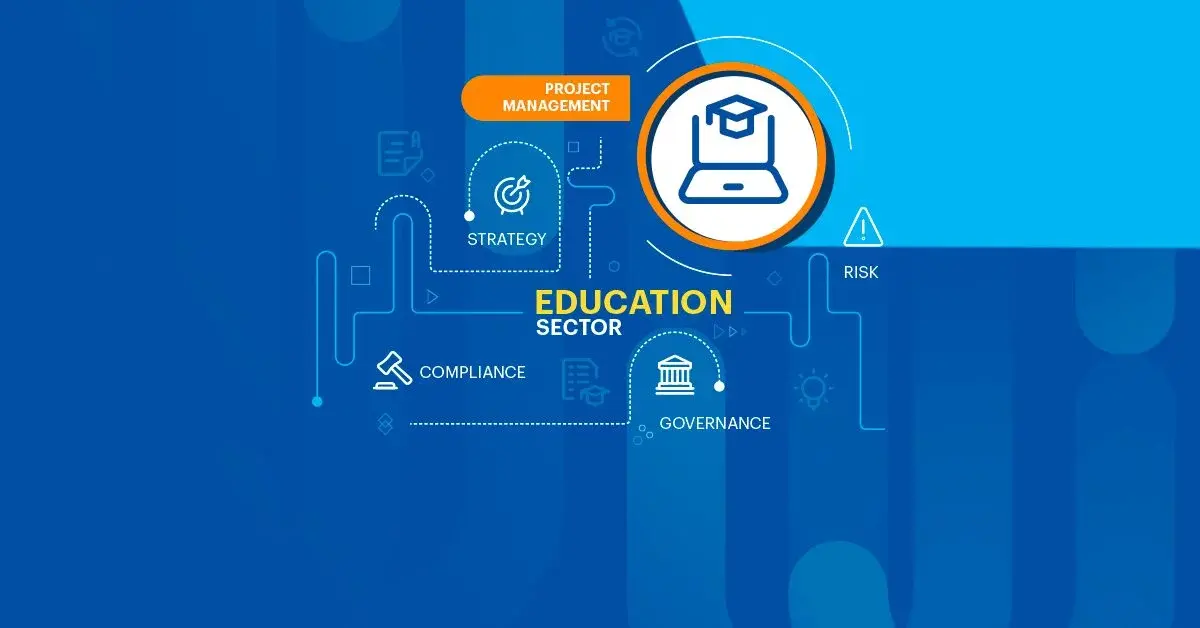As the education sector faces the imperative to continually improve and adapt, the role of effective project management stands out as essential for achieving success. Project management in education goes further than traditional business practices, embracing the distinct challenges and opportunities that educational institutions present, including aligning with teaching staff goals and objectives.
This strategic methodology ensures that educational entities, from schools to universities, can effectively roll out initiatives that boost their quality of service, infrastructure, and engagement with all stakeholders.
The Importance of Project Management in the Education Sector
The critical nature of project management within the education sector is undeniable. With the futures of young individuals and the societal demand for equitable, superior education at stake, the deployment of adept project management strategies becomes crucial for setting and meeting project goals.
Such strategies empower educational institutions to fulfil ambitious goals related to educational reform, technological progress, and infrastructure enhancement, even within the limits of tight budgets and strict timelines. Furthermore, project management cultivates a culture of accountability, ensuring that educational projects are in line with overarching institutional objectives and compliance standards.
This strategic congruence is vital for those institutions that strive to deliver outstanding educational experiences and achievements.
The Complexities of Educational Project Management
Managing projects in the educational sphere involves overcoming a complex array of challenges, including ensuring all team members are aligned with the project’s goals and objectives amid the vast regulatory environment. Projects can range from improving physical infrastructure to revising curricula, or implementing digital innovations, each with its distinct hurdles and dependencies.
These endeavours necessitate careful planning, implementation, and ongoing oversight to ensure they meet educational goals and the expectations of stakeholders. The intricate nature of such projects requires a customised approach to project management, one that honours the specific culture, objectives, and limitations of educational institutions.
Unlock the future of learning with Camms tailored project management solutions that will transform your educational institution.
Employing Strategic Project Management in Educational Institutions
It’s not just students who must manage projects effectively in their pursuit of excellence. The educational institutions – schools, colleges, and universities – that are charged with imparting the knowledge and skills they need to flourish, must manage multiple projects & portfolios to enhance their facilities and the level of education provided – to stay relevant.
Educational projects often vary in size and time to completion – from larger projects like constructing or modernising facilities, introducing new technology or rolling out a new curriculum, to smaller – yet critical – projects like parents’ evenings, after-school activities, and induction days.
Forward-thinking educational institutions understand that traditional manual processes – such as spreadsheets, emails, shared drives, and documents – create inefficiencies when collaborating on projects and tracking progress amid a multitude of dependencies and risks. Consequently, they are turning to specialist project management tools that support the delivery of critical – and complex – projects on time by establishing a structured framework that fosters effective collaboration and facilitates transparent information sharing amongst teams.
How Project Planning Tools Can Help
Specialist software allows education institutions to understand projects – and the associated tasks & risks – using a structured framework that provides the foundation for holistic management – and the benefits are compelling:
- Break down larger projects into smaller tasks and actions.
- Assign ownership of each element of the project throughout the organisation.
- Adds a layer of governance & structure, ensuring important milestones are not missed.
- Captures information in a consistent format enabling progress to be easily tracked.
- Maps key milestones & timelines and prompts staff to tick off the status of completed tasks.
- Facilitates structured sign-off and approval workflows for senior stakeholders.
- Provides financial oversight: map budget plans, track estimates, get budget approvals, log expenditures, forecast expected expenditures, and capture unforeseen costs.
- Log purchase orders and invoices to reconcile expenditures throughout the project lifecycle, with everything dated, time-stamped, and documented, making budget management more manageable.
- Track the resources and time allocated to specific project areas, enabling leaders to plan accordingly and ensure measurable and achievable objectives.
- Link project management to legacy systems via application programming interfaces (APIs), allowing operational data to be aligned with projects – and organisational objectives.
Lead with purpose! Boost your ESG efforts with our comprehensive software. Make sustainability your strategic advantage. Learn more about our social governance software.
Managing Multiple Stakeholders
The successful delivery of specific projects is underpinned by a variety of stakeholders – both internal and external. For example, projects sometimes require the support of a third-party contractor, such as builders for construction and maintenance projects or managed service providers for digital transformation projects – adding a layer of complexity to the project management process.
The ability to set up workflows – with dependencies – for specific stages of a project is particularly useful when multiple stakeholders are involved. Projects are sometimes hindered by task bottlenecks, preventing stakeholders from completing their tasks on time because previous steps have been delayed.
Specialist project management tools can be used to implement workflows that send automated notifications when specific tasks are completed or the required approval has been authorised. This allows each team member to commence their task without delay – driving efficiency and helping achieve project deadlines.
The successful delivery of projects in education mirrors the intricate project management in the pharmaceutical industry, where multiple stakeholders must align for successful outcomes.
Enhanced Data Sharing and Communication
Project management software facilitates efficient data sharing across teams and stakeholders. This single-pane-of-glass view allows stakeholders to track the progress of each stage of the project via an intuitive dashboard – and understand the role they play in the project management process. Laborious progress meetings subsequently become unnecessary due to the oversight provided by the software, enabling teams to monitor progress more efficiently.
Empowered by valuable insights at the touch of a button, project managers can streamline projects more efficiently, eliminating the need to chase staff for status updates. This provides the structure and understanding required to achieve a holistic approach to project management that’s driven from the top down and implemented from the bottom up throughout the project lifecycle.
Project management software supports collaboration across teams and departments, ensuring consistent processes are implemented throughout the educational institution. Real-time dashboards – which can be viewed by all stakeholders at any time – and built-in reporting functionality, allows progress reports to be produced instantaneously for individual tasks to guide the allocation of resources and budgets across multiple projects and balance workload & expenditure.
Discover how our solutions can transform your organisation. Schedule your demo today and see the difference!
Improved Governance, Risk and Compliance
Mature educational institutions and Local and regional governments (LRG) use project management software that is augmented by governance risk and compliance (GRC) capabilities, and strategy management and incident management tools – added functionality that offers several benefits:
- Software solutions that incorporate risk management ensure project-related risks are added to the risk register and tracked. Controls can be established to flag risks using key risk indicators (KRIs) and tolerances.
- Software solutions that incorporate GRC capabilities consider the compliance requirements of all projects. These requirements can be linked to the obligations register, allowing necessary adjustments to be made when a relevant regulation changes or is created.
- Education institutions that harness strategy management tools can link projects to their overall strategy and leverage progress functionality to understand their ability to achieve organisational goals.
- Best-practice incident management tools can be used in conjunction with project management software. This enables all project-related incidents to be logged and managed through to resolution – including automated alerts ensuring relevant stakeholders are notified immediately, effectively keeping the project on track and within the deadline. Root cause analysis can also be conducted to understand how an incident happened and proactive measures can be implemented to mitigate the risk, making future projects more manageable.
Embracing Project Management Software for Education
The scope for project management tools to enhance the education sector is leading to their rapid adoption in schools, colleges, and universities – consigning antiquated manual processes to the past. Their ability to enhance the implementation of key projects and initiatives through automation is helping these institutions to improve facilities and the level of education for students.
To find out how the Camms project management tool can add structure and ownership to your project & portfolio management process, request a demo. Discover more about how the Camms platform is supporting organisations in the education sector.





